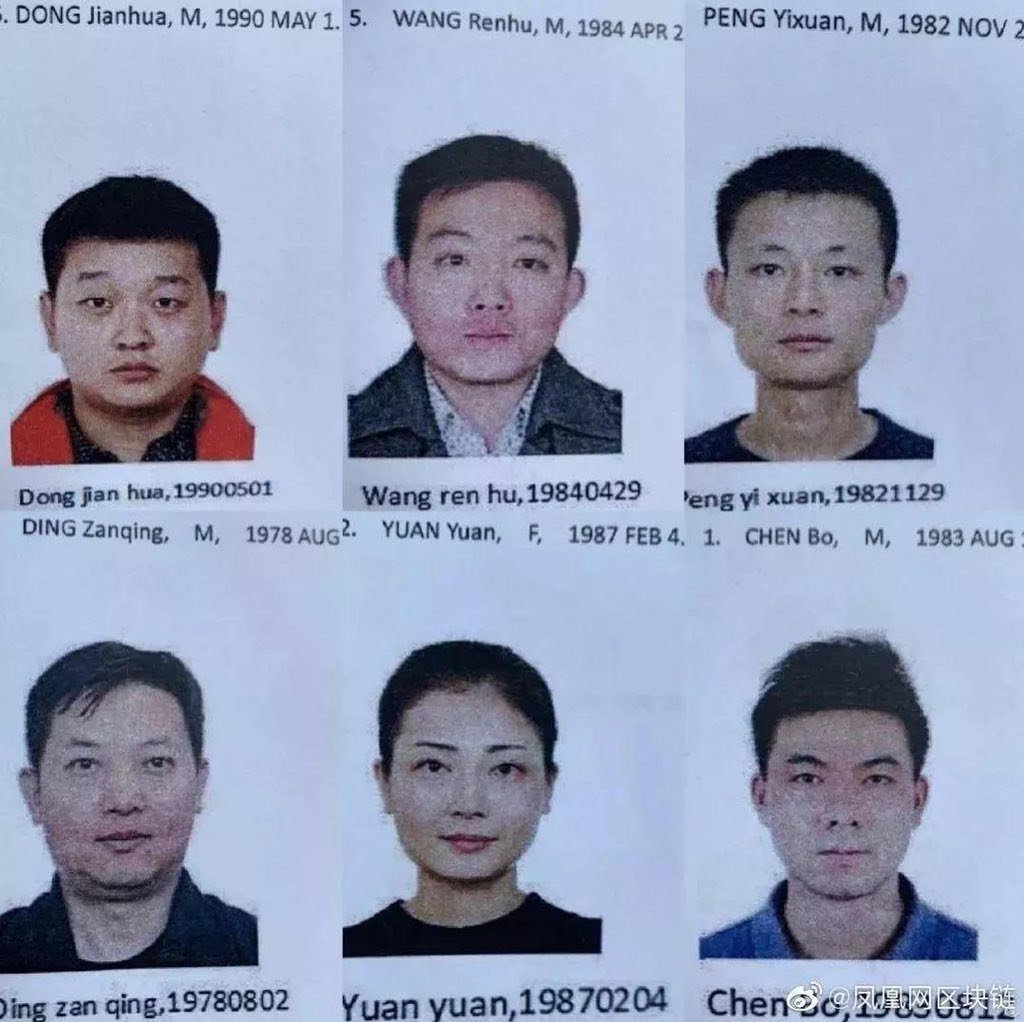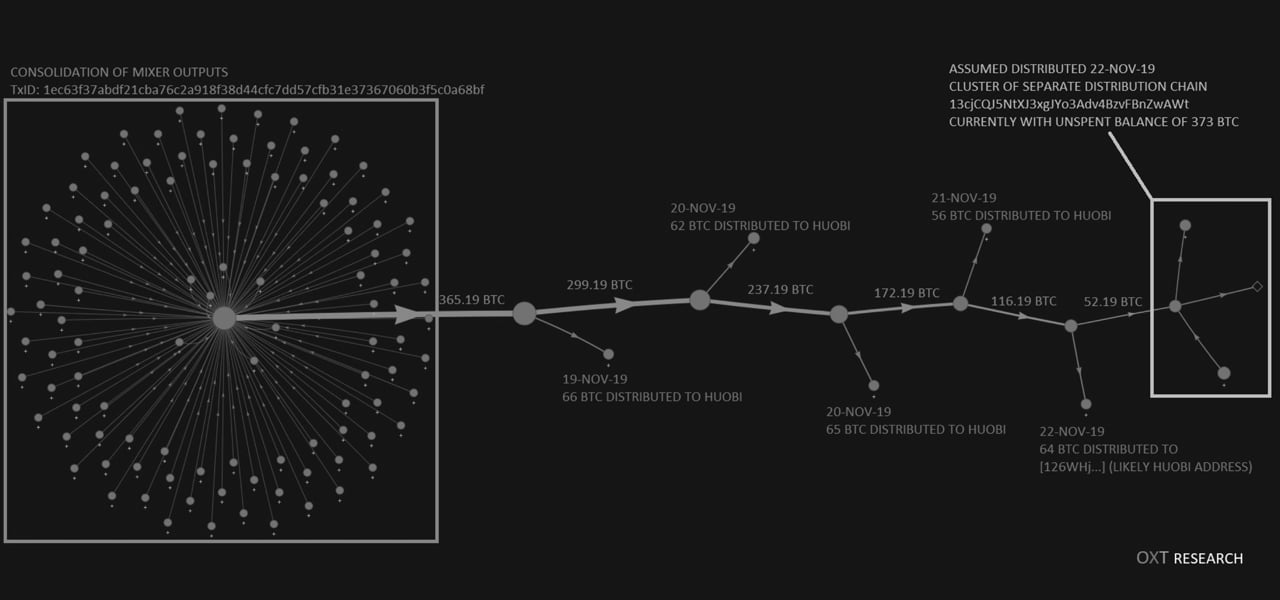A number of masterminds from the Plustoken scam were sentenced to 11 years in prison for defrauding cryptocurrency investors. Last week, on November 19, a court ruling had shown the Chinese government said that it seized over $4 billion in crypto assets from the Plustoken scam. Meanwhile, onchain sleuths believe the Chinese government may have already sold a great number of the coins and simply added the proceeds to the central treasury.
Plustoken Masterminds Sentenced to Up to 11 Years in Prison
Just recently, a Jiangsu Yancheng Intermediate People’s Court ruling published on November 19, shows the Chinese government seized a massive sum of crypto assets worth over $4.2 billion.
According to the court filing, Chinese law enforcement confiscated 194,775 BTC, 833,083 ETH, 79,581 BCH, alongside a large trove of LTC, EOS, DASH, DOGE, and the stablecoin tether (USDT).

New information from the South China Morning Post (SCMP) indicates that a number of the Plustoken gang leaders have been sentenced to prison for their deeds. The court ruling had previously detailed the assets seized derived from seven members of the Plustoken gang.
The SCMP report indicates that the multi-level-marketing (MLM) crypto scam was originally invoked in 2018 by an individual named Chen Bo. The project promised high returns and attracted millions of participants until the project’s leaders exit scammed in mid-2019.
The report also reveals that Chen and his fellow associates leveraged social media and meetups to attract victims to the project. Plustoken members promised members returns of up to 18% for an arbitrage business that never really existed. Chen and other top MLM gang leaders managed to attract 3,200 tiers of investors and close to three million Plustoken members at the height of its popularity.
Onchain Research Indicates the Bitcoin Hoard Was Probably Sold Last Year
Now in the crypto world, numerous proponents are not too concerned about the logistics of how the Plustoken scammers defrauded cryptocurrency investors. That part of the story is obvious, as the world watched the Plustoken scam unfold like many other pyramid schemes. The biggest concern, even before the masterminds were taken into custody, is what happened to the crypto assets that the scammers obtained from victims.
The court filing tells the public that the illicit proceeds from the Plustoken scam “will be processed pursuant to laws and the proceeds and gains will be forfeited to the national treasury.” However, @Ergobtc a researcher from OXT Research, has been sharing information about the stolen coins and it is assumed by those in the blockchain analytics field that the coins were sold on the open market.

OXT Research has recently published a special report about the subject after the team studied the onchain action. Moreover, the researchers estimate that the post-shutdown Plustoken bounty was a whopping 200,966 BTC ($3.8 billion). Most of the latest reports about the Plustoken scam have not told Ergo and OXT Research’s story, as many assume the Chinese government still has these coins. Ergo has extensively tracked the Plustoken addresses and he has detailed that the coins were also mixed before they were sold.
The study claims that 20,000 BTC ($382M) were mixed via the Wasabi wallet and over 150,000 BTC ($2.8B) were mixed via a very simple process OXT researchers dub “self-shuffling.” It is assumed that most of the coins were sold last year after being mixed and whoever sold them ostensibly leveraged the Huobi exchange.
Lots of selling allegedly began in mid-2019, all the way until the end of the year. Additionally, the regional reporter and crypto blogger Colin Wu has also been tweeting about the fact that the Chinese government probably sold the coins for fiat.
“The Chinese government seized 190,000 BTC and 830,000 ETH from the Plustoken MLM case, with a total value of billions of dollars,” Wu tweeted. “The official announcement seems to indicate that the government has sold it and returned to the central treasury managed by the central bank. The local reporter added:
We currently don’t know how the Chinese government sells [this] crypto, and whether they are exchanged for CNY or USD. But Chinese exchanges such as Huobi have a good relationship with the police, they will provide assistance if police ask for it.
Governments Are Seizing More Troves of Crypto Assets These Days
Further, Ergo also tweeted about Chen Bo’s cooperation with the police. “Let me get this straight, Chen Bo, the mastermind of PlusToken (arrested in June 2019), was entrusted with selling Plustoken’s BTC, via a third party business, on behalf of the CCP?” Ergo said. “In return, he only gets [eight] years in the gulag for architecting a multi-billion [dollar] Ponzi?” the researcher asked.

Ergo has also been discussing the news that the company Chaindigg was employed to dispose of the Ponzi’s coins and there may be a connection to the Wotoken scam tokens as well. Wotoken was a similar pyramid scheme and it has been suggested that Wotoken and Plustoken masterminds were somehow connected.
Last October, news.Bitcoin.com reported on the Wotoken masterminds getting sentenced to prison, as the Intermediate People’s Court of Yancheng city, Jiangsu province, denied the convicts appeal. After showing some token graphs of the Wotoken coin transactions, Ergo also wondered:
Does it imply, Chaindigg was responsible for handling Wotoken’s coins as well? This would explain why the coins were tossed into the same algo.
The OXT researcher also asked whether or not “Western surveillance firms” would be following these transactions.
Governments are handling large troves of seized digital assets a lot more these days and it is assumed that last year the Chinese Communist Party (CCP) was one of the largest bitcoin holders. The news also follows the U.S. government’s recent Silk Road bitcoin seizure when they confiscated approximately 69,370 BTC, BCH, BSV, and BTG.
Ergo’s findings indicate the CCP sold the digital assets, which suggests that most of the selling is over. The researcher’s statistics show there may be roughly 15,000 BTC remain, while roughly 170k BTC was allegedly sent to known digital currency exchange addresses.
What do you think about the Plustoken investigation and the onchain findings? Let us know what you think about this subject in the comments section below.
Image Credits: Shutterstock, Pixabay, Wiki Commons, OXT Research, Twitter,
Disclaimer: This article is for informational purposes only. It is not a direct offer or solicitation of an offer to buy or sell, or a recommendation or endorsement of any products, services, or companies. Bitcoin.com does not provide investment, tax, legal, or accounting advice. Neither the company nor the author is responsible, directly or indirectly, for any damage or loss caused or alleged to be caused by or in connection with the use of or reliance on any content, goods or services mentioned in this article.
